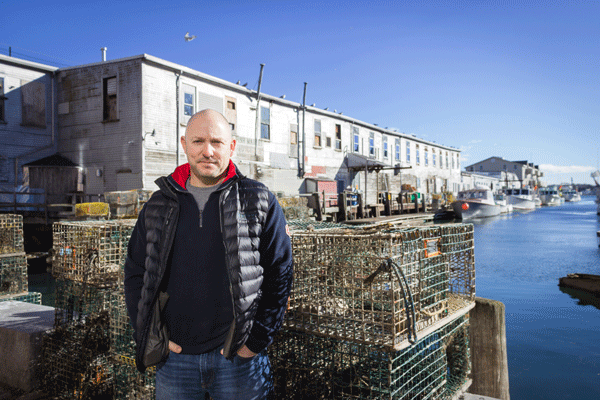Peter Dufour, a tax attorney and CPA, visits the Portland waterfront near his office. He serves on the board of directors of Friends of Casco Bay. Photo Andrea Nemitz
Portland-based tax attorney and CPA Peter Dufour considers the benefits of a donor-advised fund versus a private foundation, including being able to involve family members in the decision-making.
MaineCF: How do you bring up the topic of charitable giving with your clients?
Peter Dufour: Usually, it’s in the context of year-end planning. Accelerating expenses and deductions into the current year is an important strategy. Making a charitable contribution is one way to do this.
When clients are charitably inclined but aren’t sure which charities they want to support, having the option of making contributions to a donor-advised fund is a useful tool. They can take the tax deduction in the current year and then have more time to do research. With the pending tax reform for 2017, I proposed the Maine Community Foundation as an option for my clients several times in December. I like the fact that the starting point for a MaineCF donor-advised fund is $25,000. That’s affordable for many of my clients.
MaineCF: Once you know a client is charitably inclined, how do you help that person decide which assets to give to charitable organizations?
Dufour: The most bang for your buck is a gift of appreciated assets, such as stock. The client does not have to pay income taxes on the appreciation of the stock and typically can qualify for a charitable deduction equal to the current fair market value.
MaineCF: What are some of the circumstances under which you might recommend a client make a qualified charitable distribution directly from an IRA?
Dufour: When a client is over age 70½ and they’re phasing out of certain tax benefits because their income is too high. If you want to have less income on your return, making a direct contribution from an IRA to a charity ensures that the income never hits your return. This type of contribution can’t be made to a donor-advised fund or a private foundation, but it can be made to other types of funds at the Maine Community Foundation.
MaineCF: What are some of the questions you ask a client when he or she is weighing the decision to start a private foundation or maybe open a donor-advised fund?
Dufour: How much money do you want to contribute? I don’t think a private foundation makes sense if you’re going to contribute less than $3 million because the administrative costs and work involved in operating a private foundation are pretty substantial. You need to have enough money to cover the costs and still accomplish your goals.
MaineCF: When clients are considering a private foundation, most likely they talk to you about the tax implications. Yet often the decision has to do with including family members in decision-making. Have you seen families establish a donor-advised fund and also continue to have family members involved?
Dufour: Absolutely. One case I referred to you a few years ago involved a woman who had a private foundation. The assets had been diminished over the years so it was getting to the point where it was hard to justify continuing to operate the foundation. I suggested terminating the foundation and moving the assets into a donor-advised fund where the operating costs would be substantially less. Going forward, she could still involve her family in deciding which charities would receive the funds.
MaineCF: Do you have anything else you’d like to share with other professional advisors about charitable giving or about the charitable conversations you have with your clients?
Dufour: CPAs know that it’s hard to be the source of all the good planning ideas for charitable giving. I don’t have the time to focus on that solely, but MaineCF does. If I have questions or if I have clients who have questions, it’s easy for me to send them to you to have that conversation, knowing they’re getting the best possible advice.
Peter Dufour began his tax career as an attorney at Hill & Barlow in Boston where his practice focused on mergers and acquisitions and tax planning for large corporations and high-net-worth individuals. In 2015, he co-founded Dufour Tax Group, LLC, in Portland. Prior to his career as a tax attorney and CPA, Dufour was a math teacher with the Peace Corps in Zimbabwe and at Hebron Academy. He is a University of Maine graduate and earned his dual law degree and MBA at Boston College. Dufour serves on the board of directors of Friends of Casco Bay and lives in Portland with his family.






